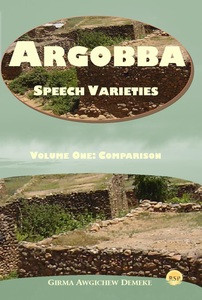Categories
Categories
Authors
Authors
- Home
- Language/Linguistics
- ARGOBBA SPEECH VARIETIES: Volume One: Comparison, by Girma Awgichew Demeke
ARGOBBA SPEECH VARIETIES: Volume One: Comparison, by Girma Awgichew Demeke
Product Description
Argobba belongs to the South Ethio-Semitic language group and is considered to be in critical endangerment. It has at least four speech varieties which are grouped in this book as North Argobba (NA) and South Argobba (SA). This book is a comparative analysis of the grammar and lexicon of the two groups of Argobba considering one speech variety from each. For a better understanding, data from Amharic, the closest relative of Argobba, is considered and compared against the two groups throughout the book.
An examination of the grammar and lexicon of NA and SA shows differences which go beyond dialect. NA has pharyngeal sounds which do not exist in SA. Whereas SA has the voiced palatal fricative ž, NA does not. The difference that we see between NA and SA on subject agreement markers is not less than the difference that any one of these two has to Amharic. SA and Amharic have identical definite markers, which are developed from the third person singular possessive agreement elements. NA has different definite markers in most constructions. SA and NA have more cognates than either of them has with Amharic in shorter wordlists. The differences between NA and SA in general are too much for the speech varieties to be considered as dialects of a single language.
From a typological perspective, NA and SA have a complex relation to Amharic. For instance, in terms of copular elements, NA and SA are closer to each other than either of them is to Amharic. When it comes to possessive clauses, SA and Amharic are the closest. In the negation, we see similar complex relation between NA, SA, and Amharic. The lexical comparison also shows similar complexity. In the 1000-item list, SA and Amharic are the closest with sharing 70.6% cognates whereas in the shorter wordlists SA and NA have more cognates. Considering the grammatical and lexical differences between NA and SA and the complex typological relation that they have to Amharic, this work argues that NA and SA are independent languages and should be treated accordingly. This is in conformity to the native speakers’ claim that they do not understand each other’s variety.
ABOUT THE AUTHOR
GIRMA A. DEMEKE works mostly on the history and syntax of Ethio-Semitic languages. He has been engaged also in language development projects and in the documentation and revitalization of endangered languages. He is the author of the Origin of Amharic and other books and articles. Dr. Demeke is currently working as a Senior Research Fellow at the Institute of Semitic Studies, Princeton, New Jersey.
GIRMA A. DEMEKE works mostly on the history and syntax of Ethio-Semitic languages. He has been engaged also in language development projects and in the documentation and revitalization of endangered languages. He is the author of the Origin of Amharic and other books and articles. Dr. Demeke is currently working as a Senior Research Fellow at the Institute of Semitic Studies, Princeton, New Jersey.
 Loading... Please wait...
Loading... Please wait... 


